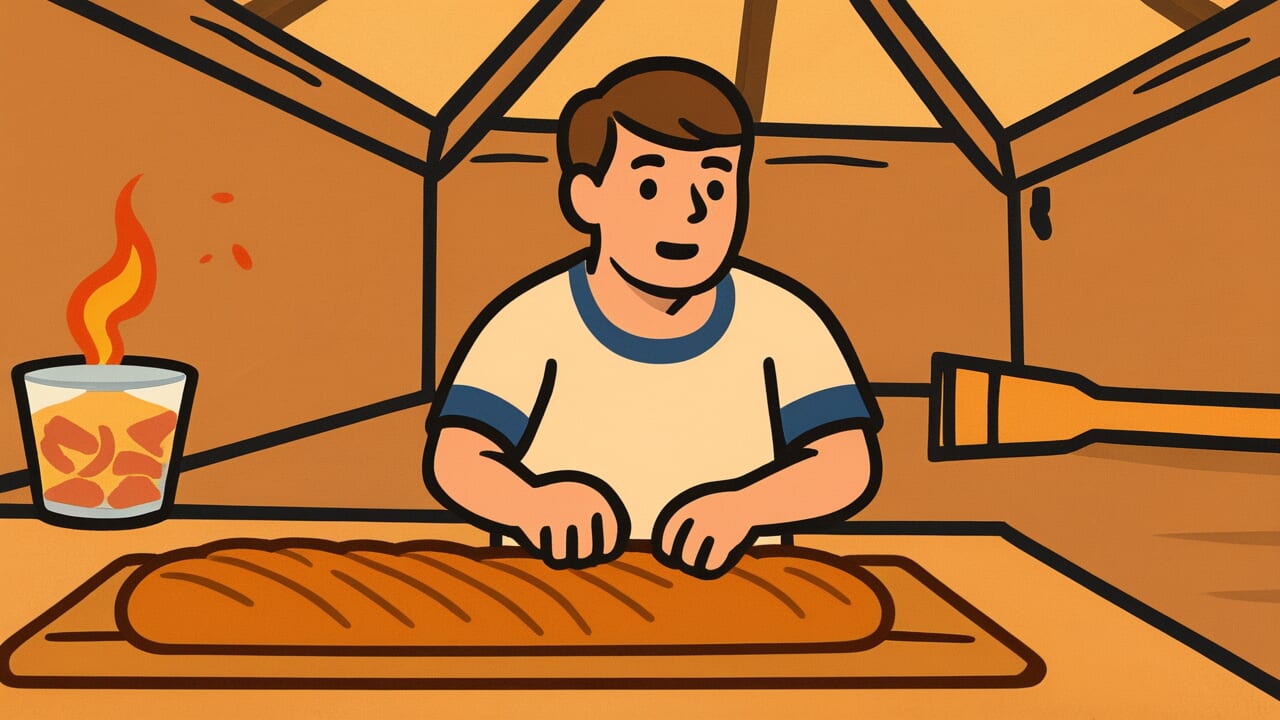How to Read “One who cannot even get enough of chaff and husks does not strive for fine meat”
Sōkō ni dani akazaru mono wa ryōniku wo tsutomezu
Meaning of “One who cannot even get enough of chaff and husks does not strive for fine meat”
This proverb means that someone who cannot be satisfied with simple food should not seek luxurious meals.
But it’s not just about saving money. It teaches a deeper truth about life.
Without gratitude for what you have now, you’ll never feel satisfied no matter what you get.
People use this saying to warn against seeking luxuries beyond your means. It also helps those who constantly complain about their current situation.
The first step to true abundance is appreciating what’s right in front of you.
In our modern world, material wealth comes easily. That makes this proverb more important than ever.
Before chasing expensive things, recognize the value of what you already have.
Origin and Etymology
This proverb likely came from ancient Chinese philosophy that spread to Japan.
“Chaff and husks” refers to sake lees and rice bran, the most basic foods. “Fine meat” means premium grains and quality meat, symbols of luxury.
“Dani” is an old Japanese word meaning “even,” used for emphasis.
The proverb reflects Confucian ideas about moderation. In ancient China, living within your means was considered a virtue.
It reveals a truth about human nature. Someone unsatisfied with simple food won’t find fulfillment in luxury either.
We don’t know exactly when it reached Japan. But similar expressions appear in Edo period teaching books.
It probably spread through samurai education. At that time, frugality was highly valued.
People accepted it as a warning against extravagance beyond one’s station.
The structure shows it’s not just about saving money. It’s a deep lesson about the importance of contentment.
Interesting Facts
The term “chaff and husks” appears in another famous Chinese story.
During the Later Han Dynasty, an emperor asked his minister Song Hong to divorce his poor wife and marry a princess instead.
Song Hong refused, saying “I cannot abandon the wife who shared chaff and husks with me in poverty.”
Here too, “chaff and husks” symbolizes poverty. The phrase celebrates the importance of bonds forged through hardship.
The “fine grains” in “fine meat” refers to quality grains, not common millet or barnyard grass.
In ancient China, food quality indicated social status. Only nobles and the wealthy could eat fine meat.
This proverb was born in that class-based society.
Usage Examples
- My son complains about every meal, so I reminded him that one who cannot even get enough of chaff and husks does not strive for fine meat
- Before complaining about your salary, remember that one who cannot even get enough of chaff and husks does not strive for fine meat
Universal Wisdom
This proverb reveals a truth about human satisfaction. It comes from your inner attitude, not outer conditions.
Why can’t people be satisfied with simple food? Because they lack the ability to recognize the value of what’s before them.
With that mindset, even luxury brings the same dissatisfaction.
Humans have an instinct to seek “something better.” This trait was necessary for survival and evolution.
But this desire can expand endlessly and cause suffering.
Our ancestors understood this human nature deeply. That’s why they taught the importance of cultivating inner contentment before pursuing outer wealth.
This proverb has survived because it contains timeless wisdom. No matter how much material wealth increases, human psychology stays the same.
A heart that cannot appreciate what it has will never be satisfied with anything.
Our ancestors passed down this universal truth in simple words.
When AI Hears This
In control engineering, we always check “controllability” before operating complex systems.
This asks the fundamental question: “Can this system even be controlled?”
What’s interesting is that achieving advanced control mathematically requires the ability to stabilize more basic state variables first.
Consider rocket attitude control. If you cannot control the basic variable of tilt, trajectory correction becomes mathematically impossible.
Control theory views state space hierarchically. Stability at lower dimensions determines the controllable region at higher dimensions.
Basic-level control ability physically constrains the range of achievable goals.
This proverb shows the same principle in life as a dynamic system.
Inability to stabilize the basic state variable of daily meals proves that control inputs like effort and resources aren’t functioning properly.
Attempting to transition to the higher goal state of luxury without meeting controllability conditions is mathematically unreachable.
Control theory teaches that stability of your current state matters more than goal height.
Basic control ability determines the boundary conditions of your future possibility space.
Lessons for Today
This proverb teaches you that the shortcut to happiness is actually very simple.
It starts with rediscovering the value of what you already have.
The meals you eat daily, the house you live in, the tools you use, and the people around you.
The moment you take these for granted, your heart becomes unsatisfied.
Modern society constantly presents “something better.” Open social media and you see someone’s luxurious life. Ads recommend new products.
But before jumping at those, pause for a moment. Do you feel grateful for your current life?
If not, getting anything new will just repeat the same cycle.
What matters is balancing ambition with gratitude. Be satisfied with what you have while aiming for better.
This balance is the path to true abundance.
The power to improve your life isn’t far away. It exists right now in how you hold your heart this very moment.



Comments